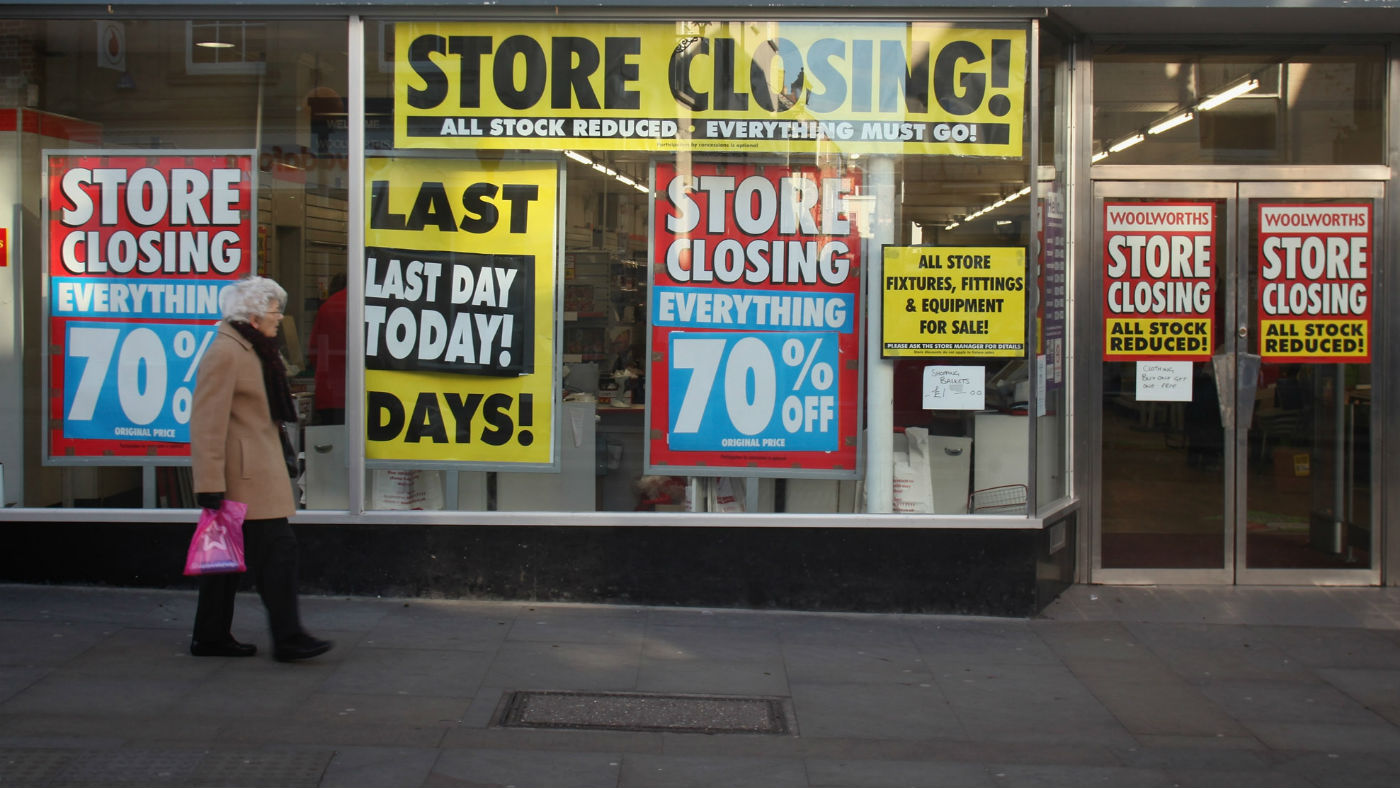How your small business can recover from setbacks
All SMEs get knocked back from time to time. Here's how to turn adversity to your advantage

A free daily email with the biggest news stories of the day – and the best features from TheWeek.com
You are now subscribed
Your newsletter sign-up was successful
The path to the top is never easy in business, and some of today's biggest success stories have previously flirted with oblivion. Apple, for example, suffered 12 years of losses before Steve Jobs returned in 1997 and set it on course to be the world's most valuable company.
Nor is it just the giants who can turn hardship to their advantage. When Anita Roddick set up the Body Shop it was located between two funeral parlours. They objected to the name and tried to close her down. Instead of allowing her fledgling business to go to the wall she fought back, telling a local paper she was a woman entrepreneur under siege. The story created a storm of valuable publicity, and Roddick went on to oversee an empire of 700 shops.
These comeback marvels, and many others like them, beat the odds because they have one trait in common: a remarkable entrepreneur at the helm with fantastic leadership skills and the ability to make bold moves in the face of adversity.
The Week
Escape your echo chamber. Get the facts behind the news, plus analysis from multiple perspectives.

Sign up for The Week's Free Newsletters
From our morning news briefing to a weekly Good News Newsletter, get the best of The Week delivered directly to your inbox.
From our morning news briefing to a weekly Good News Newsletter, get the best of The Week delivered directly to your inbox.
Your business is certain to face critical problems at some point. If you want it to go down in history as a phoenix rather than a footnote, follow the advice of the experts and you will be in a better position to avoid a knockout blow when the time comes.
Joanna Davies, managing partner at the creative marketing agency Wolfpack, says determination is key: "Running a business is hard. The best advice is simple: don't give up. You have to be addicted to the highs to get through the lows. If you haven't had that feeling yet, keep going because it's the reason many entrepreneurs carry on working long after they've banked their millions."
Where others see only problems in adverse situations, successful entrepreneurs see opportunities for improvement.
"Always remember the quote 'you don't judge a man by the times he gets knocked down but by the number of times he gets up'," says Monica Parker, an organisational behaviourist at Morgan Lovell workspace consultants. "So long as there is a lesson, you can learn and get back up."
A free daily email with the biggest news stories of the day – and the best features from TheWeek.com
Dealing with major problems is what separates top entrepreneurs from fairweather entrepreneurs, according to Dr Maurits van Rooijen, rector at London School of Business and Finance (LSBF).
"A top entrepreneur will gain from a setback," he says. "It will reinforce the determination to succeed, even against all odds. It is also a learning moment: Why did I not foresee this? What could I have done differently to avoid being in such a vulnerable position?"
Spotting problems early, getting the right help at the right time and having a contingency plan are essential, according to Sue Hayes, managing director of Barclays Business Banking.
"Businesses are usually saved when problems are raised early and when there is a viable business plan and a management team in place," she says. If you are in any difficulty, speak to your business manager at your bank, who should be able to help."
When times are tough it pays to be nimble and if you are adaptable in your thinking it can reveal an unexpected positive side to facing challenges. John Styring, CEO of Igloo Books, believes adversity can turn an ugly-duckling business into a swan. "Change can be a catalyst for growth," he says. "This is most likely to be true for you if your organisation is flexible and ready to adapt."
A common problem is losing staff, which can be a major blow for an SME and makes it hard to meet the expectations of customers. There are also costs associated with recruiting. If you struggle to retain talent, Daniel Todaro, MD at Gekko Group marketing agency, recommends reconsidering the factors that originally made it a great place to work.
"Understand the reason you're haemorrhaging staff then find the underlying problem and work your way back to a point where your staff were happiest," he advises.
Staying on top of finances is also essential in a crisis as cash-flow is the lifeblood of a small business. You must keep a tight grip on the daily bank balance and be prepared for emergency outgoings.
"SMEs have a tendency to be financially independent," Dr Steve Priddy, head of research at the London School of Business and Finance, says. "They should make provisions for a 'rainy-day fund'."
In the event of any setbacks, businesses can tap into their reserve fund rather than taking on more debt.
Smaller companies often have problems actually getting paid for work they have carried out. More than £30 billion is owed to small businesses in outstanding debts, and the government is considering introducing a late payment levy to penalise late-paying companies. Mark Edwards, manager at Rocket Lawyer, an online legal service, says that businesses can often recover money owed to them by following a few simple steps.
"Good business practice can often achieve the desired outcome," he says. "A professionally worded late payment reminder letter can prompt a customer or another business to take swift action to pay your invoice."
Whatever problems you encounter on the road to business success, remember that you're in good company. "Congratulate yourself for being in a fraternity of a long line of failures who eventually made it," Parker says. "Failing fast is an approach to be emulated in start-ups these days. JK Rowling, Arianna Huffington, Donald Trump, Richard Branson, Oprah Winfrey and Madonna are just a few of the successful people who had to deal with multiple setbacks in their journey.
"Problems are part of success. View them as a badge of honour and a step forward in your longer-term plan."
Creative Commons image by Anders B
-
 How the FCC’s ‘equal time’ rule works
How the FCC’s ‘equal time’ rule worksIn the Spotlight The law is at the heart of the Colbert-CBS conflict
-
 What is the endgame in the DHS shutdown?
What is the endgame in the DHS shutdown?Today’s Big Question Democrats want to rein in ICE’s immigration crackdown
-
 ‘Poor time management isn’t just an inconvenience’
‘Poor time management isn’t just an inconvenience’Instant Opinion Opinion, comment and editorials of the day
-
 The FTC is pushing back against false 'Made in the USA' claims
The FTC is pushing back against false 'Made in the USA' claimsThe Explainer The agency has dubbed July 2025 'Made in the USA' month
-
 Could ‘Amazon tax’ save struggling high street retailers?
Could ‘Amazon tax’ save struggling high street retailers?Speed Read Labour considering move to level the playing field between online retailers and brick-and-mortar shops
-
 Personality test: Which Olympic sport matches your leadership style?
Personality test: Which Olympic sport matches your leadership style?In Depth Team player or solo superstar: answer these quiz questions to find out your ideal Olympic discipline
-
 Confidence to grow: The UK economic outlook in 2015
Confidence to grow: The UK economic outlook in 2015feature In 2015, the UK economy is set to accelerate. So how can entrepreneurs and businesses of all sizes take advantage of the positive outlook?
-
 How to gear up your business for exports
How to gear up your business for exportsIn Depth There's money to be made in exports, but risks too. Here's our guide to selling overseas
-
 Mind your cashflow: how to avoid the SME pitfall
Mind your cashflow: how to avoid the SME pitfallIn Depth Too many growing businesses mis-manage their cashflow. Here's how to bridge those gaps
-
 How to keep good staff – and keep them happy
How to keep good staff – and keep them happyIn Depth To build a successful small business, everyone needs to pull in the same direction
-
 Miliband bank debacle: has he just thrown away the election?
Miliband bank debacle: has he just thrown away the election?In Depth The value of taxpayer-owned banks drops by £1bn – and Osborne outflanks him with £7 minimum wage support
